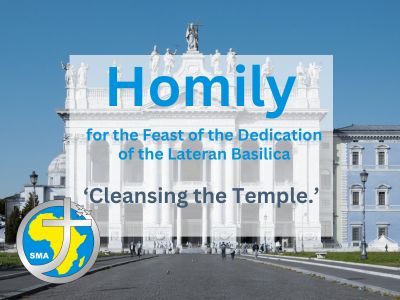Readings: Ezekiel 47: 1-2,8-9,12; 1 Corinthians 3:9-11;16-17; John 2:13-22
Theme: Cleansing the Temple
By Michael McCabe, SMA
Today, instead of the usual Sunday liturgy, we are celebrating the feast of the dedication of a Church – the Lateran Basilica in Rome. Built by the Emperor Constantine, it was solemnly dedicated on the 9th November, 324. As the first and oldest Christian basilica, it is considered ‘the mother and head of all churches of Rome and the world’. It the Pope’s Cathedral as Bishop of Rome. In celebrating this feast we express our union with out Pope, Leo, and our loyalty to him as supreme leader of the Church. The feast also invites us to reflect on the important role of church buildings in our lives as communities of faith, called to worship and pray together. It also challenges us to recognise our personal baptismal identity as temples of the Holy Spirit, and to confirm that identity by the way we live.
Our readings today tell us about two Temples, the Temple of Jerusalem, and the temple that is Christ’s body. In the first reading, the prophet Ezekiel uses the image of a mighty river flowing from the temple of Jerusalem, and enriching the land, to express his hope for the renewal of Israel. The river flows not from any earthy source but from God himself. Ezekiel envisions a time when the river of God’s grace and blessing will flow from his throne, bringing healing and transformation to the land and its people – surely a hope to keep in our prayers on this blessed day.
Our gospel reading from John describes Jesus’ cleansing of the Jerusalem temple. On entering the temple precincts, Jesus is shocked to see the money changers and merchants selling doves and sacrificial animals. In anger, he makes a whip out of cords and drives them out of the temple area, telling them to stop making his Father’s house into a marketplace (cf. Jn 2:15-16). This surprising and drastic action of Jesus reminds us that the Temple, and indeed every church, is not an ordinary place but a house of worship, a place where people encounter God in a special way. As the Sacred Congregation for Divine Worship reminds us: ‘A church is the place where the Christian community gather to hear the word of God, to offer intercession and praise to him, and, above all, to celebrate the Eucharist…. And it is the place where the Blessed Sacrament is kept’. Hence, it is appropriate that churches are treated with appropriate respect and reverence.
I was fortunate to grow up at a time in Ireland when my local church, St Bridget’s, Mountnugent (Meath diocese), was central to the life of the small rural community in which I spent the first eighteen years of my life. Our church was not just a place where we gathered for Sunday Mass, for funerals, Holy Hours and Benediction. It was also the place where many members of the parish made regular visits to the Blessed Sacrament, or prayed the Stations of the Cross, or just spent a few moments in quiet prayer. The sound of the Church bells punctuated our daily work routines, reminding us to pray the Angelus, or to get ready for Mass. We never passed by the Church on the road without blessing ourselves with the sign of the Cross. Sadly, those days are long gone and, with their passing, we could ask ourselves: have we lost something precious – that sacred reminder of who and what we are as members of Christ’s body?
To return to our gospel reading, we see Jesus reminding his Jewish audience of his imminent death and resurrection, using the temple as an image: ‘Destroy this temple and in three days I will raise it up’ (Jn 2:19). As St John explains, Jesus is referring to the temple that is his body, not the Temple of Jerusalem. Jesus has become the new and indestructible temple of God – God’s ever enduring presence with us. And, by our union with Christ in baptism, we too, as St Paul reminds us in our second reading, are temples of God: ‘Do you not know that you are a temple of God, and that the Spirit of God dwells in you?…God’s temple is holy, and that temple is you’ (1 Cor 3:16-17).
In a homily he preached on today’s feast, the sixth century French saint, Caesarius of Arles, explains the above statement of Paul in the following words: ‘Baptised, we have become temples of Christ. The more profoundly we meditate on our salvation, the more deeply we come to realise that we are indeed the true and living temples of God. God does not live only in shrines made by human hands, structures of wood and stone but above all he lives in the soul which is made after his image; shrines built by the hand of the great craftsman himself. As we celebrate the Dedication of the Lateran Basilica – a famous building made of wood and stone – let us keep in mind that the Church is not just the building where we gather for worship, but, above all, the community of believers, temples of Christ, shrines built by the hand of God – shrines ever in need of renovation.
So we, pray:
“Lord, cleanse and renew us with the life-giving streams of mercy and love that flow from your throne, and make us true temples of your Spirit, united in love with your Son, Jesus Christ, with our Holy Father, Pope Leo, and with one another. Amen.”
Alternative audio Homily by Tom Casey, SMA:

